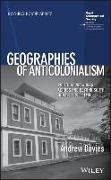- Start
- Geographies of Anticolonialism
Geographies of Anticolonialism
Angebote / Angebote:
Theoretically sophisticated and empirically rich, Geographies of Anticolonialism takes a spatial approach to the study of anticolonialism. Through an exploration of a cluster of little-known but fascinating figures situated in the French South Indian enclave of Pondicherry - poet Subramania Bharati, nationalist mobilizer V.O. Chidambaram Pillai, international anarchist M.P.T. Acharya and spiritual nationalist Aurobindo Ghosh - Andrew Davies makes a major contribution to the study of Indian freedom struggle as well as to global anticolonial thought.' A.R. Venkatachalapathy, Professor of History, Madras Institute of Development Studies, India
'In this wide-ranging, engagingly written and provocative historical geography of anticolonialism, Davies threads together analyses of sea networks, land hubs, politico-spiritual utopias and anarchist internationalism, which return to but are not confined within South India. Anticolonialism here broadens the scope of the de-colonial and adds ideological and material politics to the postcolonial, brilliantly contesting the territorial and epistemological boundaries of colonial geography.' Stephen Legg, Professor of Geography, University of Nottingham, UK
Geographies of Anticolonialisb brings together a varied selection of historical sources and literature to explore Indian anticolonialism in new ways. Anticolonialism, an often overlooked concept in geography, can be defined as internal and external resistance to the practices and by-products of colonial rule, such as racism, militarism, resource exploitation, and land dispossession. Linked to, but different from post- and decolonial approaches, anticolonial geographies are explicitly political in nature - offering a different perspective to geographers seeking to understand political resistance to colonialism.
The author addresses contemporary studies that argue nationalism was joined by other political processes, such as revolutionary and anarchist ideologies, to shape the Indian independence movement. A focus on a specific anticolonial group, the "Pondicherry Gang, " investigates their significant impact which exceeded their small numbers and short period of activity. Operating in the south of India, an underrepresented area of study when compared to Bengal and the Punjab, members of the Pondicherry resistance became spiritual gurus, reinvigorated the Tamil language, and conducted the only political assassination in the region. In examining such activities, Geographies of Anticolonialism helps readers understand the diverse nature of anticolonialism, which in turn prompts thinking about the various geographies produced through anticolonial activity.
Lieferbar in ca. 10-20 Arbeitstagen
